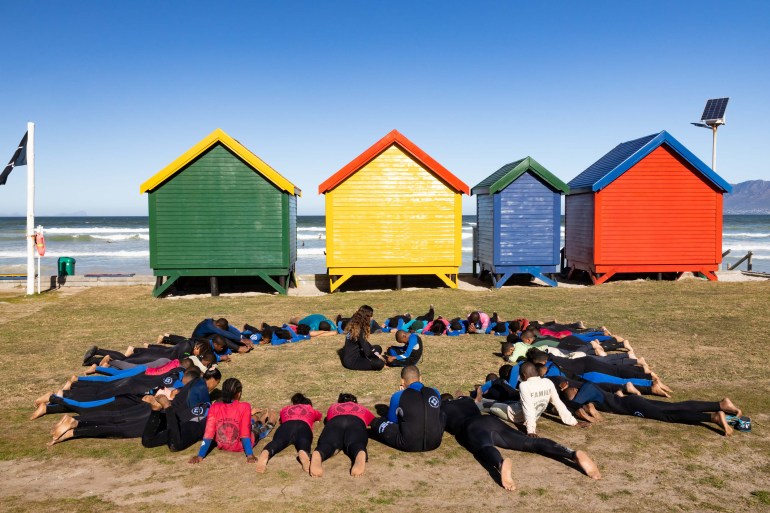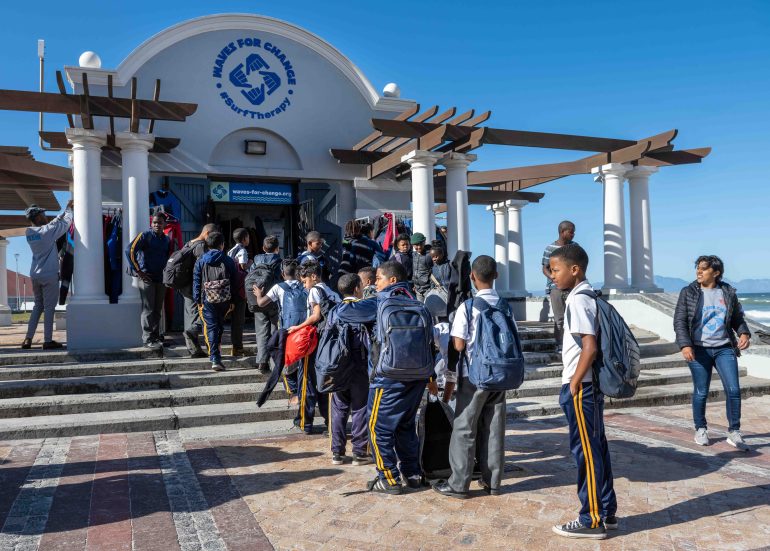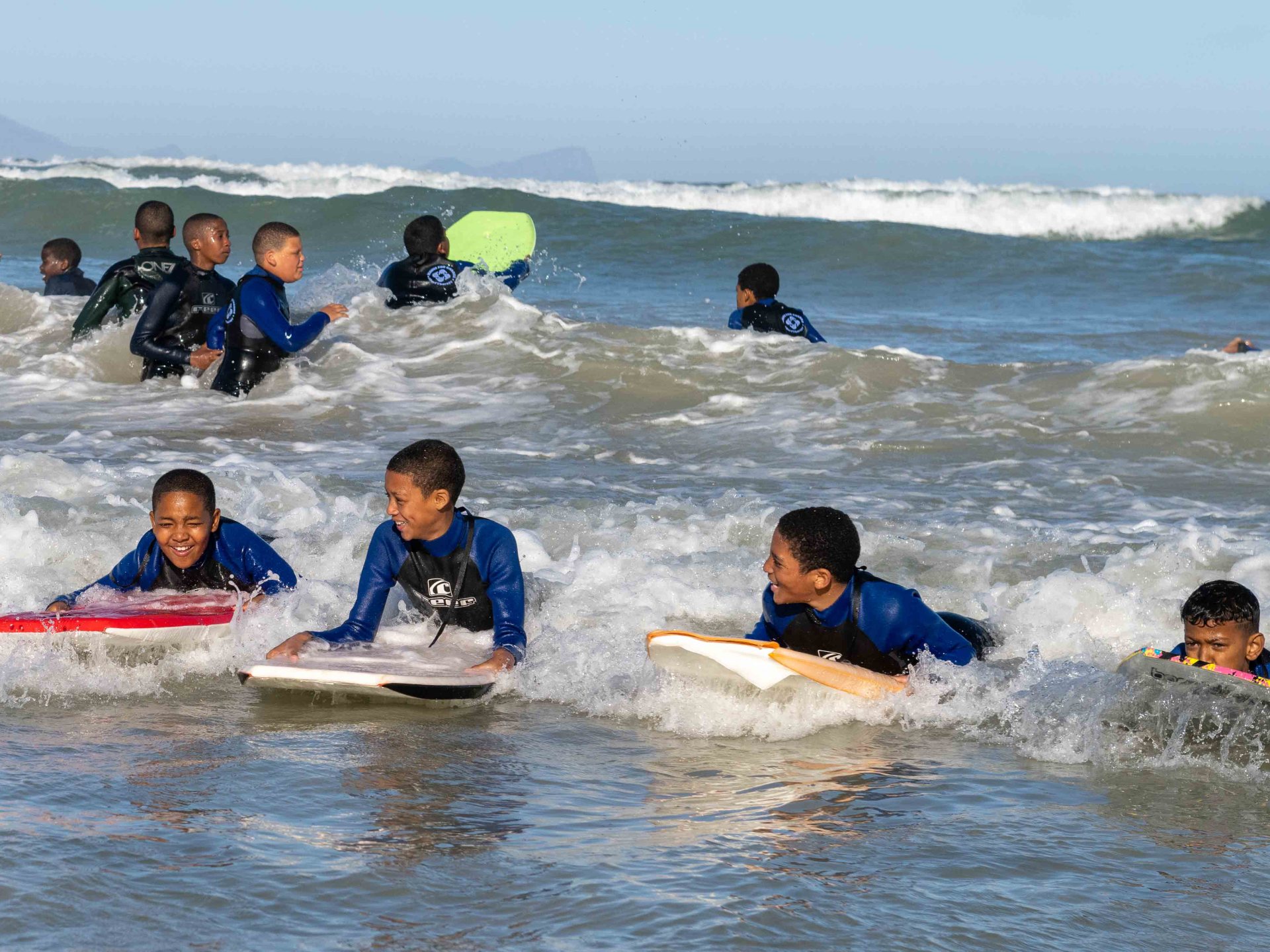Cape City, South Africa – It’s a Monday morning and a dozen youngsters from a college for college students with autism and associated circumstances have arrived for his or her weekly surf remedy session.
Shrieking with glee, one woman envelops her coach in a bear hug. Others are much less demonstrative, however the pleasure on their faces is palpable.
After buying and selling their faculty uniforms for wetsuits, the scholars collect on Cape City’s Muizenberg Seaside. A mild offshore breeze is blowing, and neat rows of waves stack up invitingly in direction of Cape Level. However earlier than the budding surfers get close to the water, they need to do a land-based psychological well being session.
The day’s lesson, coach Bulelani Zelanga informs Al Jazeera, known as Grateful Take 5.
First, the coaches checklist three issues they’re grateful for.
“I’m grateful that I discovered Waves for Change,” Zelanga says. “I’m grateful for my assist community. And I’m grateful that I’m nonetheless respiration.”
Subsequent the kids are taken by way of a collection of respiration workouts and inspired to consider issues they’re grateful for. There’s no stress to share these with the group, however a couple of courageous souls put up their fingers.
“I’m grateful for my coaches,” one says. “I’m grateful for my mother and father,” says one other.
After about 20 minutes on the seashore, it’s time to get into the ocean. A lot of the contributors are content material with splashing round within the waves – lots of them can’t swim – however a couple of strive their hand at bodyboarding.
Whereas they play, the coaches are available to reassure them – and to encourage them to make use of their newly acquired respiration abilities to deal with the unfamiliar surroundings.
Zelanga says there’s extra precise browsing when the neurotypical children come within the afternoons, however he additionally says this isn’t the purpose: “Remedy comes first, browsing is second.”

And with good motive: Kids in South Africa’s townships can steadily expertise traumatic occasions, and there’s a dearth of social employees and psychologists of their communities.
“We aren’t looking for the subsequent Kelly Slater,” Tim Conibear, the 42-year-old founder and CEO of Waves for Change, tells Al Jazeera, referring to the nice United States surfer.
“It’s all about giving children from tough backgrounds coping mechanisms and self-regulation methods. Browsing is simply the hook.”
‘Sport gives a shortcut’
Waves for Change works with kids aged 11 to 13 who’re at high-risk of “poisonous stress”, equivalent to these affected by poverty, disabilities, gang violence, or an absence of entry to psychological well being and social companies, They’re referred by a trainer, nurse or social employee.
For the primary eight weeks, the children merely “train one another to surf” with the assistance of their coaches, Conibear says.
“As soon as now we have this tightknit group who all belief one another, we begin educating them psychological well being abilities and coping methods,” equivalent to self-regulation, sharing and conscious respiration.
Kids are transported to and from the seashore, and every session ends with a nutritious meal. Children attend one session per week for a yr, after which they will go to an off-the-cuff surf membership on the weekends, which additionally consists of free transport and a meal.
Many children participate in surf membership for 5 – 6 years, Conibear says. From there, they will apply for a job as a Waves for Change coach on a two-year contract. Waves for Change encourages coaches to review additional and helps them to discover a job when their contract expires.
Coaches have gone on to educate at surf resorts in Bali, be part of the police drive, turn out to be fitness center instructors and, in fact, work at surf retailers close to their dwelling seashores.
With 5 websites in South Africa and one in Liberia, Waves for Change now delivers its surf remedy programme to 2,500 kids each week. And that is earlier than you issue within the 1000’s of youngsters who profit from the sports activities remedy programmes run by 35 accomplice establishments in 10 international locations.
“We’ve realised that we will attain tens of 1000’s of individuals all over the world by making our supplies open supply and by serving to sports activities golf equipment of all descriptions to adapt them to swimsuit their actual wants,” Conibear says.
But it surely wasn’t all the time this manner. When Conibear based the programme in 2007, it was simply him, his VW Golf and 4 children from Masiphumelele township.
Conibear, who grew up in the UK, moved to Cape City in 2006 to work on a vineyard after which acquired a job with a browsing journey firm.
“Once I arrived in South Africa from the UK, the inequality was simply so stark. … I needed to get entangled locally,” he remembers. “I assumed: ‘I get rather a lot out browsing, and I’m positive they’ll too.’ Easy as that.”
So he put the phrase out. On the primary weekend, there have been 4 folks ready to be picked up. In week two, there have been eight. Quickly Conibear had changed his Golf with a Kombi and was spending his Saturdays ferrying as much as 50 children between Masiphumelele and Muizenberg.
Two of these first 4 surfers – Apish Tshetsha and Bongani Ndlovu – turned Waves for Change’s first coaches.
“We’d go online and possibly have a scorching chocolate afterwards,” Conibear recollects. “I observed that the children had shaped bonds with the coaches. I don’t converse isiXhosa, however I might see it was a mentoring state of affairs.”
For the primary few years, Conibear, Tshetsha and Ndlovu ran the programme on a volunteer foundation on weekends solely.
Issues modified in 2010 when the FIFA World Cup, hosted by South Africa, introduced numerous funding alternatives into the sports-for-development sphere – together with 10,000 kilos ($12,600) from a British firm and 100,000 rand ($5,350) a yr from the Laureus Sport for Good Basis.
“At first I used to be a bit bowled over,” Conibear laughs. “I didn’t have a clue how we’d spend the cash.”
However he shortly realised that bringing Tsetsha and Ndlovu on as salaried staff and operating the programme on weekdays would allow him to achieve much more children.

Because the programme grew and the staff realised it was about excess of educating children to surf, Conibear began bringing researchers on board – equivalent to Andy Dawes, an utilized developmental psychologist – to refine the programme.
“The elemental idea of any therapeutic intervention is giving folks the chance to speak and be listened to,” Conibear says. “The rationale we use browsing is that we will do lots of rapport constructing in a non-verbal manner. In speak remedy, you have to be very expert to construct a relationship. Sport gives a shortcut.”
Jamie Marshall, a analysis fellow at Edinburgh Napier College who has executed intensive analysis into surf remedy programmes all over the world, is impressed by what Conibear and the Waves for Change staff have achieved.
“Tim doesn’t have a psychological well being background. However the entire staff has been open to evaluating, studying and refining at each step, and so they all the time hearken to the specialists,” Marshall says.
A latest research of US navy service members with melancholy offered essentially the most compelling proof but that surf remedy actually does work. “Research findings confirmed improved nervousness, unfavourable have an effect on, psychological resilience and social functioning following program participation,” it decided.
Surf remedy is a really efficient software, however you have to get the basics proper, Marshall says, particularly harnessing the respite that browsing presents from each day life, fastidiously curating a secure house and embracing dynamic studying environments.
“Waves For Change ticks all three packing containers,” he says. “Getting a bodily and emotional secure house proper is a large problem. … With this sort of younger individual, if the house shouldn’t be secure. they’ll see proper by way of it. In the event you don’t do the exhausting work, the programme received’t work.”

‘It gave me a objective’
The programme nonetheless faces challenges, notably with funding and discovering the fitting folks to manage it.
One other indicator of the programme’s success is the excessive variety of college students who go on to turn out to be coaches at Waves for Change, Marshall says.
Working example is Zelanga, who was referred to Waves For Change in 2011, when he was 9 years outdated.
“I joined Waves For Change with out figuring out that they had been educating us these coping abilities,” he says. “I assumed I used to be simply studying to surf.”
Becoming a member of the programme helped him to “select the fitting buddies”, he says. Earlier than becoming a member of Waves for Change, he says he was naughty and was each a bully and was bullied.
“A few of my buddies from again then are thieves now. 4 of them have handed away. Stabbed, all of them.”
Now, he says, he’s realized to manage his feelings.
“You possibly can say unhealthy issues to my face, and I’ll simply have a look at you. I received’t do something,” he says.
Waves For Change has additionally given him a objective. Since turning into a coach, he’s taken half within the Laureus Youth Empowerment Via Sport programme, been nominated by the provincial authorities for a Teaching Excellence Award and accomplished a diploma in sports activities administration.
Subsequent yr, he plans to do one other diploma – in sports activities administration – and after that, he’s hoping to open his personal surf academy.
“I’ve been talking to some college students, and I need to begin one thing for 15-, 16-, 17-year-olds,” he says. “… They want course, and so they’re too outdated for Waves for Change.”
Who wants Kelly Slater while you’re producing folks like Bulelani Zelanga?

